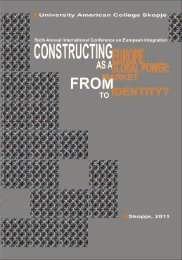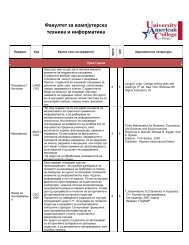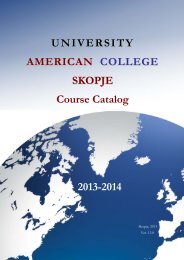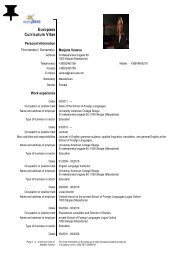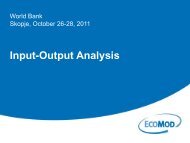BOOK OF ABSTRACTS - University American College Skopje
BOOK OF ABSTRACTS - University American College Skopje
BOOK OF ABSTRACTS - University American College Skopje
Create successful ePaper yourself
Turn your PDF publications into a flip-book with our unique Google optimized e-Paper software.
OUT <strong>OF</strong> THE CRISIS: EU ECONOMIC AND SOCIAL POLICIES RECONSIDERED8 th Annual international conference on European integrationAss. Prof. Vesna Georgieva Svrtinov, PhD<strong>University</strong> of Goce Delchev – Shtip, Macedoniavesna.svrtinov@ugd.edu.mkCapital Flows and the Eurozone Crisis-Implications for Economic PolicyHistorical experience shows that one of the root causes of financial crises are the periods of highcapital mobility. A significant number of authors agree that in the world of high capital mobility,sudden stops of capital inflows may occur, typically triggering financial crises. The latest financialcrisis in the euro zone (EZ) seems to support this point of view. Euro adoption encouraged a capitalflow bonanza to EZ periphery (Greece, Portugal, Ireland, Spain). The sudden stop which happened in2009, made it difficult for these countries to roll over debt, and thus caused a crisis. This paperanalyses the role of large capital inflows in generating the EZ crisis. It consists of three parts. The firstpart describes the episodes of so called “capital account crises” in the emerging markets, whichoccurred during the several past decades. The second part focuses on the impact of capital flows onthe latest EU crisis. In this this part it is statistically documented that the crisis in the EZ has notoccurred only as a result of fiscal indiscipline of some member states, as it is usually believed, buthave also been a result of external, systemic reasons, such as the large capital flows. The third partrecommends some measures of economic policy which could act as prevention in a situation ofreappearance of great capital inflows in the EZ periphery. Not only could the actual EU memberstates benefit from these policy measures, but the potential candidates, such as the Republic ofMacedonia as well. After a few years, investors will maybe regain confidence and once more try toseek the higher returns that are available in periphery countries. And the recipients of the resultingcapital flows will once again be vulnerable to sudden stops.Keywords: financial crisis, sudden stops, capital flows, EZ, recessionBiographyVesna Georgieva Svrtinov, PhD was born on 1 st August 1981 in Tetovo. Graduated at the Faculty ofEconomics and obtained the master degree at the “Sts Cyril and Methodius Univesrity” in <strong>Skopje</strong>. Dr.Vesna Georgieva Svrtinov received her PhD from the same faculty, doing research on the topic of“Capital Account Liberalization and Financial Stability”. During the academic year of 2012/2013 shehas been elected as an Assistant Professor at the Faculty of Economics at the <strong>University</strong> of “GoceDelchev” in Shtip. Georgieva Svrtinov is an author of several scientific and professional studies in thecountry and abroad.





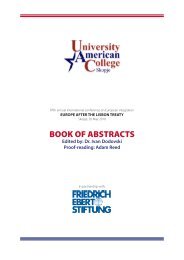

![amerikan kolex ]e bide prv univerzitet od treta generacija vo ...](https://img.yumpu.com/47278343/1/190x252/amerikan-kolex-e-bide-prv-univerzitet-od-treta-generacija-vo-.jpg?quality=85)
